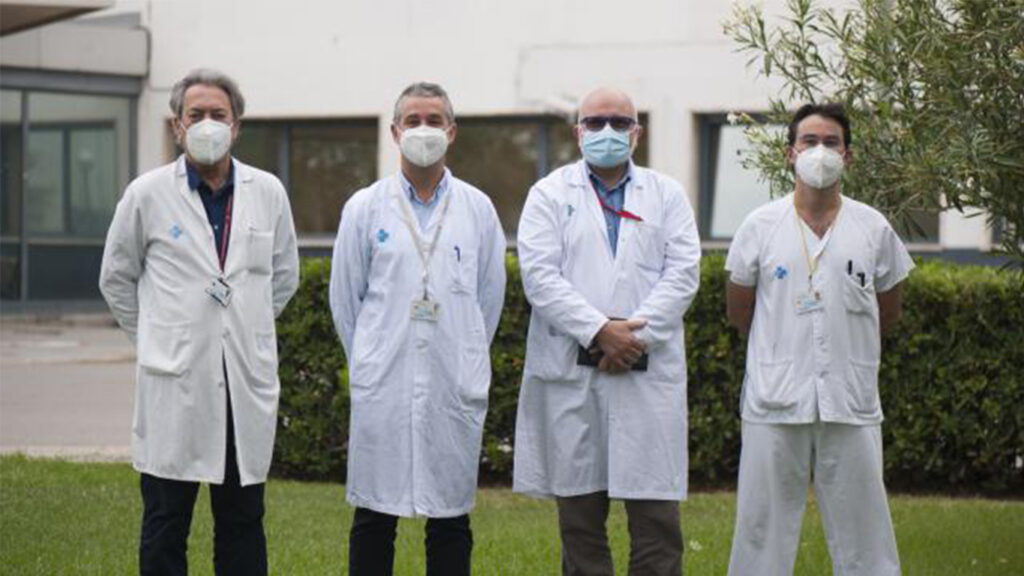An extensive study carried out in 25 hospitals in Spain, coordinated by specialists from the Bellvitge University Hospital and IDIBELL, has shown that COVID-19 patients that undergo emergency general and digestive surgery do not present higher mortality due the COVID-19.
This study, published this Saturday by the British Journal of Surgery, explains the conclusions of previous descriptive studies that indicated that COVID-19 patients presented much higher mortality than usual. These conclusions had led some experts to recommend delaying or avoiding surgeries for SARS-CoV-2 positive patients whenever were possible.
The Bellvitge University Hospital coordinated a register of all general and digestive surgeries performed from March to June of 2019 and from March to June of 2020 (first wave of the pandemic) in 25 Spanish hospitals. In total, more than 5,300 patients were studied.
First, the work compared positive and negative COVID-19 patients treated during the pandemic. A statistical analysis called propensity-score matching, which matches positive and negative patients with similar age, pathology, and general condition generated two comparable groups.
Results showed that mortality differences between these two groups were not statistically significant. Thus, the high mortality observed in patients with COVID-19 should be attributed to their age, related pathologies, and preoperative state rather than a hypothetical multiplying COVID effect on postoperative mortality.
According to the study coordinator Dr. Javier Osorio, a researcher at IDIBELL and surgeon at the General Surgery Service of the Bellvitge University Hospital, “Postponing urgent surgery has its risks, so it is very important to understand well how COVID-19 increases postoperative mortality”.
In this sense, Osorio emphasizes that, according to the study results, “COVID-19 infection should not impede surgery, the risk assessment of performing or postponing the surgery should be based individual anesthetic risk and the state at the time of diagnosis, as always”.
Another aspect of the study was the state of the pathologies comparison between patients operated on in the year before the pandemic, in 2019, and negative COVID-19 patients treated during the pandemic to understand the confinement effect. The results indicated that, during the pandemic, patients did not present more advanced peritonitis or higher inflammatory parameters. Thus, the higher mortality observed during the pandemic cannot be attributed to later diagnosis due to confinement.
Finally, the study evaluated the so-called rescue failure of patients (percentage of patients with postoperative complications who cannot be rescued and die because of the complications). The authors compared the rescue failure of COVID-19 negative patients during the pandemic with patients previous to the coronavirus explosion.
Those patients treated during the pandemic had the same risk of presenting complications that those treated before. However, they have a higher risk of dying as a result of the complications (19%, compared with 12.8% of those treated in the same period of 2019). This circumstance was detected in all 25 participating hospitals and was probably due to the complicated situation of the hospitals in the context of the first wave of COVID-19.
On the other hand, according to this study, during the March-June 2020 period 22’6% fewer urgent operations were carried out in comparison to the same period in 2019, probably due to the lower influx of patients to the emergency room during the pandemic.
According to Dr. Sebastià Videla, a specialist of the Bellvitge Hospital’s Clinical Pharmacology Service, head of the IDIBELL’s Clinical Research Department, and another author of the study: “One of the lessons that this research gives us is that, if we want to reduce the number of preventable deaths in the current and possible future pandemics, we need to improve coordination and increase public health resources”.
The Bellvitge Biomedical Research Institute (IDIBELL) is a biomedical research center created in 2004. It is participated by the Bellvitge University Hospital and the Viladecans Hospital of the Catalan Institute of Health, the Catalan Institute of Oncology, the University of Barcelona and the City Council of L’Hospitalet de Llobregat.
IDIBELL is a member of the Campus of International Excellence of the University of Barcelona HUBc and is part of the CERCA institution of the Generalitat de Catalunya. In 2009 it became one of the first five Spanish research centers accredited as a health research institute by the Carlos III Health Institute. In addition, it is part of the “HR Excellence in Research” program of the European Union and is a member of EATRIS and REGIC. Since 2018, IDIBELL has been an Accredited Center of the AECC Scientific Foundation (FCAECC).

